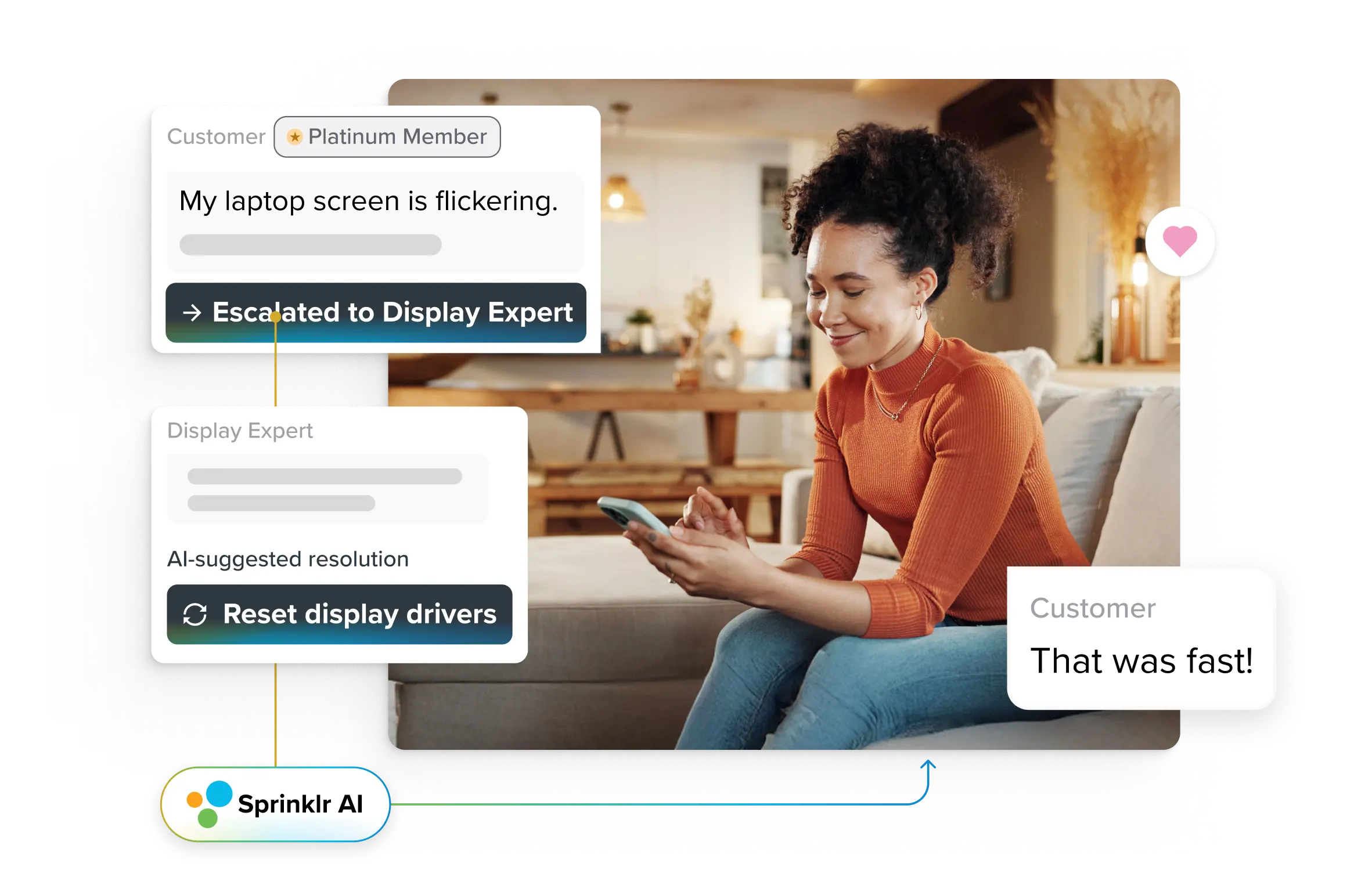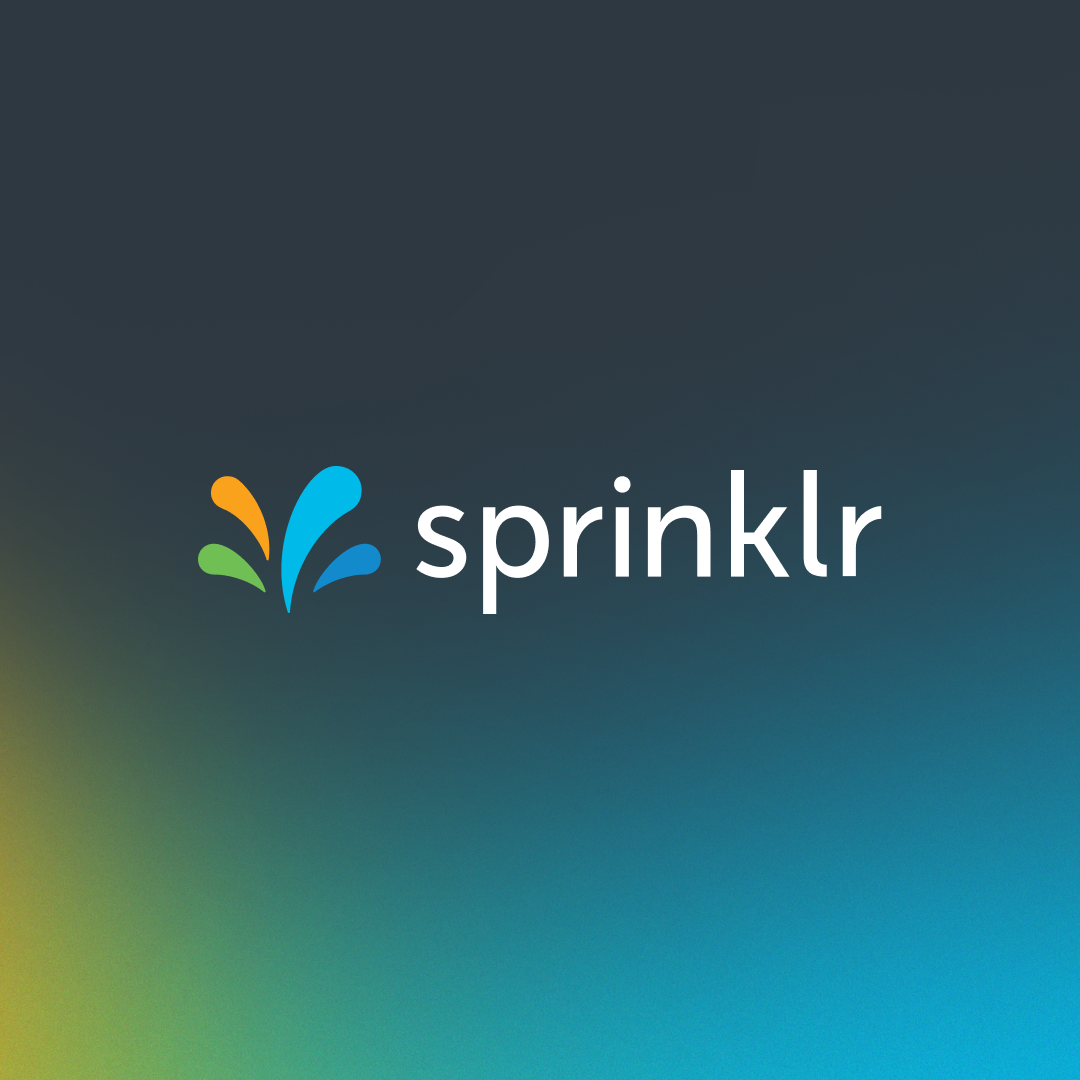Transform CX with AI at the core of every interaction
Unify fragmented interactions across 30+ voice, social and digital channels with an AI-native customer experience platform. Deliver consistent, extraordinary brand experiences at scale.

Call Center Outsourcing: A Detailed Guide for 2024
In the ever-evolving customer service landscape, call center outsourcing remains a hotly debated topic. Proponents highlight cost efficiency and scalability as key advantages, while critics raise concerns about outsourced agents' limited product knowledge and potential loss of quality control, including security aspects.
Both perspectives hold merit and ultimately, the decision to outsource your call center is a strategic one that only you can make. In this blog, we aim to provide you with the latest insights on call center outsourcing, equipping businesses of all sizes with the information they need to make an informed choice. Let's dive in.
What is call center outsourcing?
Call center outsourcing involves hiring third-party companies to manage customer interactions for your business. The objective is to reduce costs, access expert support and maintain consistent service quality across various customer touchpoints.
These outsourcing companies employ trained call center agents adept at handling customer queries across various customer service channels, including voice. They are proficient in using advanced call center technologies such as contact center CRM systems, chatbots and live chat to ensure personalized interactions and high customer satisfaction.
Businesses typically outsource their call centers when they experience rapid growth, seasonal spikes in customer interactions or when they want to focus more on core business functions while still providing excellent customer service. Outsourcing can also be a strategic move during budget constraints, allowing you to leverage the expertise of specialized service providers without significant capital investment.
Reaching a contract with a call center outsourcing company is a collaborative process. It involves a detailed assessment of business needs, defining service level agreements (SLAs) and negotiating terms that cover call center KPIs, data security and compliance requirements. Key stakeholders in this process include the CX heads, customer service managers, IT teams and legal advisors. Their involvement ensures that the outsourcing partnership aligns with the company's strategic goals and regulatory standards.
Why is call center outsourcing important to businesses
Call center outsourcing positively impacts several significant areas of your business. Let’s take a look.
Reduces costs
Call center outsourcing reduces overhead costs like salaries, benefits and infrastructure. The average pay for a customer service representative in the US is $34,000 to $46,000 per year. Outsourcing eliminates the need to hire, train or maintain an in-house team, allowing you to allocate resources more efficiently and save on operational costs.
Enhances customer experience
Outsourcing ensures that trained agents handle your customer interactions professionally, with clear benchmarks set throughout. This consistency across daily conversations, irrespective of the channel, leads to a more efficient and satisfactory customer experience. Additionally, outsourcing partners often provide multilingual support, catering to a diverse customer base and enhancing global customer satisfaction.
Offers flexibility
Call center outsourcing provides on-demand services during seasonal spikes and high-demand periods. This flexibility allows you to scale operations without the commitment of long-term contracts, making it a cost-effective solution for managing fluctuating call volumes.
Access to advanced technology
Outsourcing partners often adopt modern AI technologies such as chatbots, virtual agents, speech recognition, interactive voice response (IVR), conversational IVR, natural language processing (NLP), predictive analytics and sentiment analysis. These technologies enable you to deliver best-in-class customer services regardless of time, medium or geography, ensuring a seamless and efficient customer experience.
Focus on core business activities
Outsourcing your call center operations lets your internal team focus on core business activities and strategic initiatives. By delegating customer service tasks to experts, you can streamline your operations and dedicate more time to innovation, product development and other critical areas that drive business growth.
Improved scalability
As your business grows, call center outsourcing provides the scalability to handle increasing customer interactions. Outsourcing partners can quickly ramp up or down based on your business needs, ensuring that you always have the right level of support without the challenges of managing a growing in-house team.
Risk management and compliance
Professional outsourcing partners are well-versed in industry regulations and compliance requirements. They implement robust security measures to protect customer data and ensure adherence to legal standards, reducing the risk associated with data breaches and regulatory non-compliance.
How does call center outsourcing work
Outsourcing call centers is a full-fledged process comprising several steps. It’s essential to be clear about your expectations. Equally important is clearly defining the success metrics and conveying them to the service provider. Let’s go through the steps one by one.
Initial setup
✅ Vendor selection: Choose a reliable outsourcing partner with a proven track record in your industry. Evaluate their experience, technology (such as CRM systems and AI tools) and customer reviews, highlighting consistent performance and reliability. A thorough vetting process ensures you partner with a provider capable of meeting your specific needs.
✅ Contract agreement: The contract agreement plays a crucial role in preventing misunderstandings and ensuring accountability. Sign a comprehensive contract outlining services, costs and expectations. This includes service level agreements (SLAs) that define response times, resolution rates and performance metrics, setting clear standards for quality service. Ensure the contract also covers data security, compliance and confidentiality requirements.
✅ System integration: Assess your existing infrastructure to determine vendor technology compatibility, including CRM and communication platforms. By integrating systems effectively, you can ensure seamless data sharing and real-time communication. This step is crucial for maintaining consistent customer experiences and operational efficiency.
Training and onboarding
✅ Knowledge transfer: Provide the vendor with comprehensive information about your products, services and customer policies, including FAQs, knowledge bases, troubleshooting guides and brand guidelines. This ensures that your outsourced agents understand your brand and can provide accurate, brand-aligned support.
✅ Agent training: The vendor trains their agents using the provided information. Customer service training should cover product knowledge, communication skills and troubleshooting techniques. It's crucial that agents not only understand your brand voice and customer service management expectations but also feel connected and aligned with them, to deliver consistent and high-quality performance. Continuous call center agent training and updates are essential to keep agents informed about new products, services and policies.
Also Read: Contact Center Training: A Comprehensive Guide
Operations
✅ Inquiry handling: The vendor manages multiple customer service channels, including calls, chats, emails and social media interactions. Ensure agents follow scripts for common inquiries and adhere to protocols for handling escalations. This guarantees consistent and efficient service across all channels, maintaining a high level of customer satisfaction.
✅ Technological tools: Agents utilize advanced tools such as CRM systems for tracking customer interactions, chatbots for quick responses and call center analytics platforms to manage performance and identify trends. These tools enable streamlined operations, enhance agent productivity and provide valuable insights for continuous improvement.
✅ Quality assurance: The vendor monitors calls and interactions using call center recording and analytics tools to ensure efficient and quality customer service. They track key metrics such as response time, resolution rate and customer satisfaction scores to maintain high standards. Regular audits and feedback loops help identify areas for improvement and ensure that service levels meet or exceed expectations.
🔍 Deep Dive: The Ultimate Guide to Call Center Quality Assurance
Reporting and feedback
✅ Regular reporting: The vendor provides regular reports on performance metrics using call center reporting. Request detailed insights to track the success of the outsourcing arrangement and ensure transparency. These reports help to identify trends, areas of excellence and potential issues that need addressing.
✅ Feedback loop: Gather feedback from customers and agents to identify areas for improvement. Use this feedback to refine processes and training. For example, if multiple customers report confusion about a product feature, update training materials and scripts to address this issue. Regularly scheduled feedback sessions and customer surveys can help maintain an open line of communication and ensure continuous improvement.
Must Read: What is Customer Feedback Management and How to do it
6 key factors to consider for call center outsourcing
Now, consider the key factors to ensure sustained results from your outsourcing efforts.
📍 Location
Location plays a crucial role. A nearshore location (geographically close with similar time zones) can overlap your customer service hours more than an offshore location (farther away with significant time zone differences). This can impact customer wait times and overall service availability.
🎧 Language and accent
Consider the languages your customers speak and the desired level of fluency. Some locations offer multilingual contact center agents, but accents might be a factor. Evaluate whether a neutral or specific regional accent aligns better with your brand and target audience.
Similarly, cultural compatibility is another critical factor. Agents who grasp cultural norms can better connect with customers, build rapport and address concerns appropriately. Consider locations with cultural similarities to your target market.
💰 Business costs
When evaluating business costs, consider the setup fees for establishing the service, per-minute charges for inbound call handling and any hidden costs like additional training fees or software licenses. Compare these costs against the potential savings in overhead expenses such as office space, utilities and labor.
💰 Two cents from Sprinklr
While cost savings are a potential benefit, focus on overall value — factor in training costs, hidden fees and potential quality gaps when comparing quotes. The cheapest option might not be the most effective in delivering exceptional customer service.
🥇Service quality Ensure the outsourcing partner maintains high service quality. Review industry awards and certifications to check their track record. Look for client testimonials that highlight reliability and effectiveness. Examine SLA commitments to ensure they promise high response times and resolution rates. Quality directly impacts customer satisfaction and retention.
💼 Advanced technology and infrastructure Beyond basic compatibility, you must consider a few things before outsourcing your call center.
- API integrations: Ensure the call center has open APIs that allow seamless integration with your existing CRM system, ticketing system and communication channels (email, chat, social media). This avoids manual data entry and promotes a unified customer experience across all touchpoints.
- Security protocols: Stress the importance of robust data security measures. The call center should adhere to industry standards and relevant data privacy regulations (like HIPAA or GDPR) to protect sensitive customer information. By evaluating their encryption protocols, access controls and intrusion detection systems, you can ensure that your customers' data is secure and protected.
- Scalability & reliability: Consider future growth. The call center's infrastructure should be scalable to accommodate potential increases in call volume. Additionally, prioritize reliable uptime with minimal downtime or outages to ensure uninterrupted customer service.
- Disaster recovery plan: What happens in case of unforeseen circumstances? Evaluate the call center's disaster recovery plan to ensure business continuity. This plan should outline procedures for data backup, system redundancy and swift recovery in case of natural disasters, power outages or technical failures.
🔭 Why security-obsessed enterprises trust Sprinklr
Sprinklr prioritizes customer data security above all else. We achieve this through:
- Unwavering security standards: Sprinklr employs robust web applications, optimized infrastructure and strong governance across all modern channels to minimize customer risk.
- Expert security team: Sprinklr’s dedicated detection and response team proactively tackles threats. They excel in threat detection engineering, vulnerability management, incident response and crisis communication. This ensures the security of our products, business systems and all your entrusted data.
 Visit Sprinklr Trust Portal
Visit Sprinklr Trust Portal
🔧 Flexibility and scalability
The ability to scale operations up or down based on demand is vital. Ensure the outsourcing partner can handle fluctuations such as seasonal spikes, promotional events or unexpected surges in call volume. This flexibility ensures they can ramp up resources during peak times and scale down during slower periods.
When should we opt for call center outsourcing?
Outsourcing support operations to offshore call centers is a significant step, even for established brands. Here are a few telltale signs that it might be time to opt for call center outsourcing for your business:
When scaling quickly
If your business is growing fast, like expanding into new regions or seeing a surge in customer base, keeping up with customer inquiries can be challenging. Outsourcing helps manage this growth without the need to hire and train new staff quickly.
Take Airbnb, for example. The company outsourced call center operations and expanded its Urgent Support Line globally to maintain high service standards during rapid growth.
During seasonal peaks
Many businesses experience seasonal peaks around holidays when customer inquiry volumes spike. Outsourcing allows you to scale up your customer support during these times without the overhead of hiring temporary staff.
For instance, retail e-commerce giants like Amazon and Walmart outsource their call centers during the holiday season to manage increased customer demand. This ensures timely and efficient service without overburdening their in-house staff.
When expanding to new markets
Entering new markets often means dealing with different languages and cultural expectations. Outsourcing to a call center with multilingual capabilities ensures effective communication with new customers.
Vodafone, for example, outsourced its customer service to handle operations in various countries. It provided localized support and enhanced customer satisfaction through language and cultural understanding.
To reduce operational costs
Maintaining an in-house customer support division can be expensive in the US. Outsourcing reduces costs related to staffing, infrastructure and training.
American Express, for example, outsourced its call center operations to manage costs while maintaining high service standards. They have outsourced to countries like India, Canada and Brazil for 24/7 services, allowing them to focus on core business functions and control costs effectively.
For specialized expertise
Sometimes, your in-house team may lack the specific expertise needed to address complex customer issues. Outsourcing to a specialized call center ensures your customers receive expert support, enhancing their overall experience.
Companies like Dell and HP outsource technical support to regions like APAC, known for their skilled workforce in tech support. This approach provides cost-effective, high-quality assistance, ensuring customers get expert help for complex issues, which builds customer loyalty and boosts satisfaction.
CCaaS: A Leading alternative to call center outsourcing
While call center outsourcing offers numerous benefits, it is not a one-size-fits-all solution. Some businesses may find that outsourcing does not align with their strategic goals or operational needs. If you’re one of them, modern contact center as a service (CCaaS) solutions provide a robust alternative, empowering you to manage growing customer interactions effectively with a reasonable workforce. Here's how CCaaS empowers companies:
- Self-sufficiency & scalability: CCaaS eliminates the need for expensive on-premise infrastructure. You can easily add or remove agents as needed to handle fluctuating call volume without relying on an external vendor.
- Improved call handling & response times: CCaaS offers features like automatic call distribution (ACD) and skills-based routing, which ensure calls are directed to the most qualified agent for faster resolution.
- Automation & streamlined workflows: CCaaS can automate repetitive tasks like appointment scheduling, FAQs and password resets, freeing up agents to focus on complex inquiries and personalized customer interactions.
- Omnichannel communication: Modern CCaaS solutions go beyond traditional voice calls. They integrate seamlessly with email, chat, social media and SMS, allowing customers to connect through their preferred channel for a unified experience.
- Real-time reporting & analytics: Gain valuable insights into customer interactions. CCaaS provides real-time data and customer interaction analytics so you can identify areas for improvement, optimize agent performance and track key performance indicators (KPIs) for better decision-making.
Get the best of both worlds: Control & flexibility with CCaaS
For many businesses, outsourcing call centers hinges on a fear of losing control, sacrificing quality or compromising brand values. These concerns are understandable and highlight the need for a more integrated and flexible solution.
Enter contact center as a service (CCaaS), a game-changing alternative. Sprinklr's CCaaS solution empowers you to:
- Maintain direct control: Manage your customer service destiny, ensuring brand consistency and agent alignment with your values.
- Leverage AI for efficiency: Automate repetitive tasks and gain valuable insights to optimize operations and boost agent performance.
- Embrace omnichannel support: Offer seamless customer experiences across voice, chat, email and social media, all within a unified platform.
Sprinklr Service addresses the very anxieties that make outsourcing a gamble. It's the perfect solution if you're hesitant about outsourcing but need a robust system to handle growing customer demands. How about letting our experts know of your requirements and showing you the capabilities of Sprinklr Service?
Frequently Asked Questions
Yes, outsourced call centers can handle multiple communication channels, including phone calls, emails, live chat, social media and SMS. Modern call centers use omnichannel platforms to manage interactions seamlessly across these channels, ensuring consistent customer experiences.
To maintain a consistent brand voice and customer experience, provide detailed guidelines and training to the outsourced team. Use scripts, regular audits and feedback loops. Ensure the outsourcing partner understands your brand values and customer expectations.
Key metrics include average handle time (AHT), first call resolution rate (FCR), customer satisfaction score (CSAT), net promoter score (NPS) and service level agreement (SLA) compliance.
Look for experience in your industry, technology capabilities and strong client testimonials. Ensure they have multilingual support, robust data security measures and scalability.
Ensure a smooth transition by planning thoroughly. Create a detailed handover process, including knowledge transfer and training. Use phased implementation to shift operations, allowing for adjustments and troubleshooting gradually.











